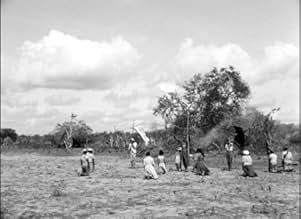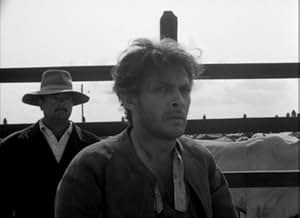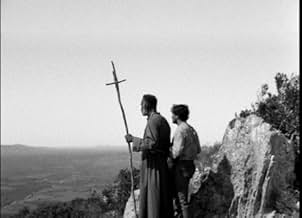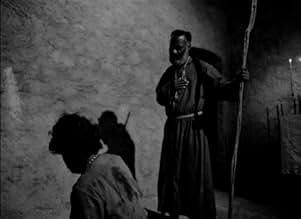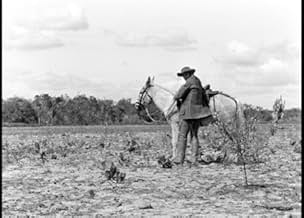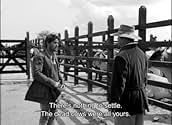IMDb RATING
7.2/10
6K
YOUR RATING
After killing his employer when he tries to cheat him out of his payment, a man becomes an outlaw and starts following a self-proclaimed saint.After killing his employer when he tries to cheat him out of his payment, a man becomes an outlaw and starts following a self-proclaimed saint.After killing his employer when he tries to cheat him out of his payment, a man becomes an outlaw and starts following a self-proclaimed saint.
- Director
- Writers
- Stars
- Awards
- 1 nomination total
Milton Rosa
- Moraes
- (as Milton Roda)
Marrom
- Cego Júlio
- (uncredited)
- Director
- Writers
- All cast & crew
- Production, box office & more at IMDbPro
Featured reviews
I loved the first two-thirds of this jaw-dropping epic. For my second viewing, this time with a friend, we both agreed that it fell to pieces after that point, becoming incoherent and unfathomable, whilst still being stylish and remaining 'strange'.
The visual sense was part 'Aguirre, Wrath of God' and Sergio Leone's 'Once Upon a Time in the West'. But, in grainy, high contrast black & white. Camera movements are urgent rather than flowing with the odd editing flourish to enliven the action. We both found this approach initially utterly mesmerising.
This film is of hardcore fanaticism, with religious bigotry and the sheer survival in the harsh scrub desert-lands of northern Brazil. Some scenes are reminiscent of Russian cinematic masterpieces by Eisentstein, as in Ivan the Terrible. I think some scenes will offend and appal many viewers whilst still retaining mystery and that 'Wow, this is something totally different and exciting'. The sort of film that has the critics swooning but with the actual film-lover rather less than overawed.
I'd rather not go into all the narrative in and outs, mostly because it is the overall effect and impression that it has left on me. Unforgettable, true; daring and significant, undoubtedly. But that doesn't make it a film any easier to watch, though. I would give the first two thirds 9/10 and the remainder five.
The visual sense was part 'Aguirre, Wrath of God' and Sergio Leone's 'Once Upon a Time in the West'. But, in grainy, high contrast black & white. Camera movements are urgent rather than flowing with the odd editing flourish to enliven the action. We both found this approach initially utterly mesmerising.
This film is of hardcore fanaticism, with religious bigotry and the sheer survival in the harsh scrub desert-lands of northern Brazil. Some scenes are reminiscent of Russian cinematic masterpieces by Eisentstein, as in Ivan the Terrible. I think some scenes will offend and appal many viewers whilst still retaining mystery and that 'Wow, this is something totally different and exciting'. The sort of film that has the critics swooning but with the actual film-lover rather less than overawed.
I'd rather not go into all the narrative in and outs, mostly because it is the overall effect and impression that it has left on me. Unforgettable, true; daring and significant, undoubtedly. But that doesn't make it a film any easier to watch, though. I would give the first two thirds 9/10 and the remainder five.
This film begins wonderfully, brilliantly shot and keenly acted- but right as you're sure it's coming to a close, the music suddenly runs uptempo and the narrator says the equivalent of "Wait, there's more!" and the second segment of the film destroys any credibility the first might have established. The director's portrayal of the desert's harshness lends logically to the lunacy of the characters- but Rosa's actions in the second half seem completely unmotivated, as if the actors ran out of script and just start making things up out of boredom in front of the camera. Laudable attempts at Eisenstein-style multiple-repeat editing are a good idea but using them to cover the low-budget nature of the action scenes is not. Overall worth seeing, but I must warn you that I fell asleep towards the end.
This movie is considered by the critics as the most important Brazilian movie of all times. And they are right in this point. An impressive, outstanding portrait of Brazilian rich culture with a focus on some delicate subjects as religion, faith, violence and economic exploration. Rocha made here a fantastic synthesis of the main problems of Brazil, problems that still remained almost forty years after. Great performances by Del Rey and Mauricio do Valle.
This movie is so fantastic! I've seen it like 10 times or so, and I still get impressed whenever I watch it. Glauber Rocha, who was a total genius, unites various elements of Brazil's Northeastern culture in a great story about alienation of the people. The story is narrated by a singer who impersonates a regional popular singer; and the visual aspects of the film and the tone of black and white are supposed to resemble the rhymes and the woodcut covers which invoke the "literatura de cordel", or "string literature", which is very common in the northeast of Brazil(not so much today, but certainly in the 60's). The film shows how the powerful control the poorest through violence and intimidation, and how religion and the "Cangaço" movement can be bad when a person without perspective and objectives in life get involved with them. Manuel, the main character, is totally alienated by the "black god" Sebastião, which resembles, in many ways, real Brazilian preacher Antônio Conselheiro; and by the "white devil" Corisco(a real Cangaceiro who worked with real and, in the 20's and 30's, widely famous Cangaço boss Lampião), wonderfully performed by Othon Bastos, while the hired gun Antonio das Mortes is on the look for both Sebastião and Corisco through the badlands of Northeast. This is a real masterpiece!!
Deus e o Diabo na Terra do Sol isn't just a good Brazilian movie. This is an actual masterpiece, compared to the big ones in the history of cinema. It's not a boring and too regional film, but deals with universal aspects of human nature, such as blind devotion, love, hate, and all kinds of misery. Glauber Rocha, with only 22 years, made a mix of Eisenstein, Italian neo-realism and nouvelle-vague, under a background of cordel literature (our pulp fictions). The Mauricio do Valle character, Antonio das Mortes, is fundamentally a European western anti-hero, and certainly inspired Leone, Corbucci and others in the development of their scripts. The soundtrack, with Villa Lobbos and Rocha&Ricardo songs, matches perfectly with the dry landscape of the Brazilian Northeast. In short, Deus e o Diabo na Terra do Sol must be known. If you have open mind and like great cinema, and not just the popcorn no-brain north-American blockbusters, try this one.
Did you know
- TriviaIn the scene where we see Manuel (Geraldo Del Rey) carrying a huge stone over his head while climbing Monte Santo on his knees, Del Rey insisted on carrying a real stone that weighted over 20 kilos - something that really worried director Glauber Rocha. After the shooting, Del Rey had to take 2 days off, as he wasn't in condition to show up.
- ConnectionsEdited into A Edição do Nordeste (2023)
- SoundtracksManuel e Rosa
Written by Glauber Rocha & Sérgio Ricardo
- How long is Black God, White Devil?Powered by Alexa
Details
- Release date
- Country of origin
- Official site
- Language
- Also known as
- Black God, White Devil
- Filming locations
- Production companies
- See more company credits at IMDbPro
Box office
- Gross US & Canada
- $7,826
- Opening weekend US & Canada
- $3,200
- Nov 19, 2023
- Gross worldwide
- $7,826
- Runtime
- 2h(120 min)
- Color
- Sound mix
- Aspect ratio
- 1.37 : 1
Contribute to this page
Suggest an edit or add missing content


